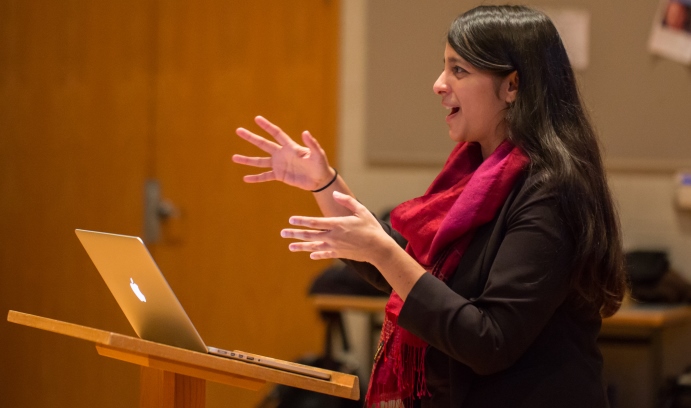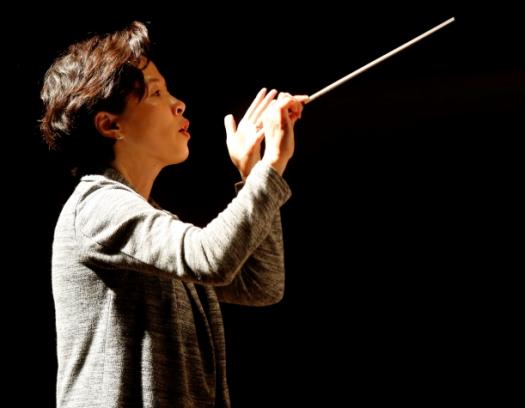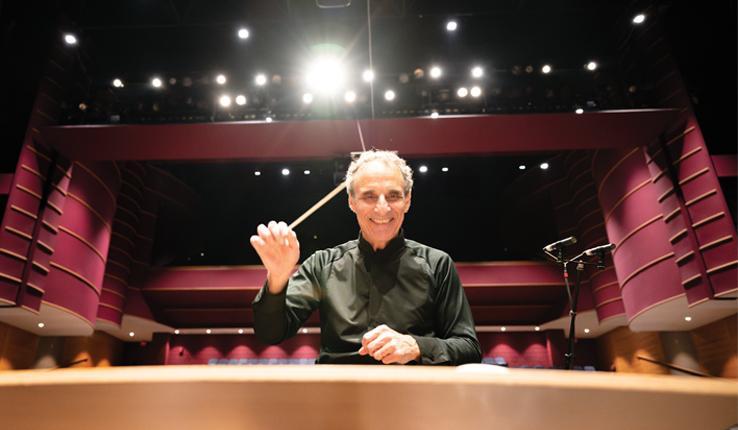Lehigh choirs rise to the challenge of new music

Composer Reena Esmail gives a presentation to Lehigh student musicians in the Zoellner Arts Center. Esmail’s “I Rise: Women in Song” will be given its world premiere by Lehigh University Choral Arts tonight (Friday, Nov. 4) and tomorrow night in Baker Hall. (Photo by Christa Neu)
Lehigh University Choral Arts will perform works by three living composers this weekend, including the world premiere of a piece by a noted Indian-American composer, in concerts at the Zoellner Arts Center.
The premiere, I Rise: Women in Song, is a five-part work for women’s chorus and mezzo soprano by Reena Esmail, a 33-year-old Californian who has been at Lehigh this week as the Ronald J. Ulrich Artist-in-Residence. The work was commissioned by Choral Arts to celebrate the tenth anniversary of the founding of Dolce, a Lehigh women’s choral ensemble, and the 45th anniversary of the admission of women undergraduate students to Lehigh in 1971.
The concerts, titled “Rise Up!,” will also feature the Sunrise Mass by the 38-year-old Norwegian-born composer Ola Gjeilo, and two newly orchestrated songs by Steven Sametz, the Ronald J. Ulrich Professor of Music and Artistic Director of Lehigh Choral Arts.
Choral Arts is made up of four ensembles: the mixed University Choir and the all-male Glee Club, both student ensembles; the Choral Union, a mixed ensemble of students, faculty, staff members and residents of Bethlehem and the region; and Dolce.
The concerts will be conducted by Sametz and Sun Min Lee, the Robert Cutler Professor of Practice in Choral Arts. Both concerts begin at 8 p.m. in Baker Hall. At 7:10 each evening, Esmail will give a public lecture in Room 143 of the Zoellner Arts Center on the process of composing and on her efforts to find common ground between the musical traditions of India and those of the Western world. (See sidebar)
Sametz, who has gained world renown over the past four decades for his choral compositions, said the concerts’ devotion to contemporary composers aligns with a larger mission to make the Zoellner Arts Center a home for the creation of new music.
“Our goal is to get people excited about new music and new composers. It sends a strong message that we have three composers sharing the creative process with the singers in Choral Arts. This does not happen everywhere.
“The three artists whose works we’ll be performing represent three very different styles of composing. Gjeilo is very influenced by film music; Esmail combines elements of Indian and reinvents them in new ways for Western choirs; my music is changing over time, as many of our singers can see, so we’re waiting to see how it all turns out.”
Gjeilo, who visited Lehigh during the last week of October, has written, “A lot of [modern] art pushed audiences away for some time. I think people naturally and instinctively want to experience transcendence, resolution and the feeling of redemption, joy and peace that the resolving of discord can yield.”
A collection of Gjeilo’s choral music recorded by the Phoenix Chorale and titled Northern Lights was named iTunes Best Classical Vocal Album of 2012.
Sunrise Mass, which Gjeilo wrote in 2007, is his longest work. Its text comes from the Ordinary of the Mass and its four movements are titled Kyrie – The Spheres, Gloria – Sunrise, Credo – The City, and Sanctus and Agnus Dei – Identity and The Ground.
“Ola has an interesting idea in setting the Mass,” said Sametz. “Usually, a Mass is presented as a prayer from the individual to the Divine. Ola has conceived of this piece as the Divine coming to the individual, as in the Incarnation.”
During the performance of Sunrise Mass, Sametz said, Baker Hall will be lit, with the light changing to reflect the mood and spirit of each movement.
Esmail, a former classmate of Gjeilo’s at the Juilliard School in New York City, has won many awards for her compositions, including the Walter Hinrichsen Award from the American Academy of Arts and Letters and two ASCAP Morton Gould Young Composer Awards. In 2011-12, she received a Fulbright-Nehru grant to live in New Delhi, India, where she studied Hindustani vocal music and was affiliated with the Faculty of Music and Fine Arts at Delhi University.
I Rise: Women in Song is based on five poems by American women: The Beauty of Their Dreams by Eleanor Roosevelt, Phenomenal Woman by Maya Angelou, River Song by Arlene Geller, Love is Anterior to Life by Emily Dickinson, and Still I Rise by Angelou. Geller, who lives in Yardley, Pa., was commissioned by Choral Arts to write River Song for I Rise. The other poems were chosen by Lee and the texts were prepared by Lee and Esmail.
“The texts are very inspiring and empowering,” said Lee. “They enable the singers to see different aspects of women’s lives in five very different movements, each with its own message.”
Esmail describes the spirit of the five movements, from first to fifth, as “serene, jazzy, epic, ethereal and driving.
“The text really reveals what the music needs to be,” she said. “I don’t typically write in a jazzy style but the choice of the words in one of the poems by Maya Angelou led me to that specific style. When you’re setting a poem to music, you’re always following the words—their meaning as well as their onomatopoeic feeling.”
I Rise: Women in Song will be performed by the singers from Dolce, as well as the women from the Lehigh University Choir and singers from the Choral Union. The mezzo-soprano soloist for the work is Megan Durham, the Dyer Artist-in-Residence and a member of the Lehigh voice faculty.
Sametz and Lee said they reviewed the works of many composers before offering the commission to Esmail.
“Reena rose to the top of the list and she generously said yes to our request,” said Sametz. “She’s very coloristic and innovative in her approach to choral sound.”
The two songs by Sametz that will be performed are We Two Boys Together Clinging, based on a poem by Walt Whitman, and doth love exist, based on a poem by contemporary poet Dakota A. Trout.
We Two Boys, which was commissioned by Natalie Foster, professor emeritus of chemistry at Lehigh, will be performed by tenor Brett Pardue, the Sametz Artist-in-Residence and a member of the Lehigh voice faculty, and bass-baritone Mark Hightower, the Finkel Artist-in-Residence.
doth love exist, which Sametz wrote in 2012 as a Christmas gift to Trout, will be performed by the men of Lehigh University Choral Arts.
In setting a poem to music, said Sametz, “I try to find what Gerard Manley Hopkins called the ‘inscape’—the interior landscape behind the words. Poetry and music open up that world to us. Our job as composers is to illuminate that inscape, to take people beyond themselves.”
Story by Kurt Pfitzer
Posted on:





